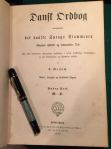Mistake in Hongs’ Translation
 Is it possible, according to Kierkegaard, for a person to appreciate, on his own, that he is outside the truth, or in error? It would appear that Kierkegaard’s answer in Philosophical Crumbs is both yes and no. That is, on the one hand he says that since this is actually our situation, “the Socratic applies,” which is to say that we can “recollect” it, or come to appreciate it on our own. On the other hand, it looks like we can’t, at least according to the Hongs’ translation of Philosophiske Smuler.
Is it possible, according to Kierkegaard, for a person to appreciate, on his own, that he is outside the truth, or in error? It would appear that Kierkegaard’s answer in Philosophical Crumbs is both yes and no. That is, on the one hand he says that since this is actually our situation, “the Socratic applies,” which is to say that we can “recollect” it, or come to appreciate it on our own. On the other hand, it looks like we can’t, at least according to the Hongs’ translation of Philosophiske Smuler.
The Hongs translate the following passage:
Dersom et Menneske oprindeligen er i Besiddelse af Betingelsen for at forstaae Sandheden, da tænker han, at Gud er til, derved at han selv er til. Dersom han er i Usandheden, da maa han jo tænke dette om sig selv, og Erindringen skal ikke kunne hjælpe ham uden til at tænke dette. Om han skal komme videre, maa Øieblikket afgjøre (om dette end allerede var virksomt i at lade ham indsee, at han er Usandheden). (Søren Kierkegaards Skrifter, Vol. 4, p. 229.)
as
If a person originally possesses the condition to understand the truth, he thinks that, since he himself is, God is. If he is in untruth, then he must of course think this about himself, and recollection will be unable to help him to think anything else but this. Whether or not he is to go any further, the moment must decide (although it already was active in making him perceive that he is untruth) (Philosophical Fragments, Princeton, 1985, p. 20).
The parenthetical remark asserts that “the moment” is active in helping people to understand that they are outside the truth, despite the fact that Kierkegaard had earlier said this was something we could discover on our own. So is Kierkegaard contradicting himself here or is there a problem with the Hongs’ translation?
The answer is that there is a problem with the Hongs’ translation. Here is how I translate this same passage.
If a person is originally in possession of the condition for understanding the truth, then he thinks there is a God, in that he exists himself. If he is in error, he may think this about himself, but recollection could not help him to think anything else. If he is to progress beyond this, the moment must decide (even if it were already active in allowing him to see that he was in error) (Philosophical Crumbs, Oxford, 2009, p. 97).
The parenthetical remark is what philosophers call a “counter-factual.” It is not saying that the moment had, in fact, been active in a person’s coming to understand himself as outside the truth, but that even if it had been active – i.e., had helped him to understand that he was outside the truth – he would need it again to get beyond this realization. That is, Kierkegaard is not taking a position here on whether one needs the moment to help one to the insight that one is outside the truth. He’s saying even if the moment had been active in helping one to this insight (a qualification that is perfectly consistent with its not being active), it would be needed again to get beyond the insight.
Of course you shouldn’t just assume that I know what I am talking about here. I need to marshal some evidence to support my claim that my translation: “even if it [i.e., the moment] were already active in allowing him to see that he was in error” is accurate whereas the Hongs’: “although it [i.e.., the moment] already was active in making him perceive that he is untruth” is not. So let’s go to the relevant reference works: Ferrall-Repp does not have “om end,” but only “om” which it translates as “if.” Vinterberg-Bodelsen has “(even) if,” before “(even) though.”
The really decisive proof that the parenthetical should be in the subjunctive comes from Christian Molbech’s Dansk Orbog from 1859 (this is the second edition and hence more reliable for questions of usage in the 1840s than is the first edition from 1833). Molbech lists a number of instances where “om” means either “if” or “whether,” but then gives the following example for “om end”: “Jeg tror det ikke, om end Alle sværge derpaa,” which translates as: “I don’t believe it, even if everyone would swear to it.”
Of course this begs the question in that I have chosen to translate “om end” as “even if” instead of “even though.” The justification for my translation comes after the first formulation. That is, immediately following the example “Jeg tror det ikke, om end Alle sværge derpaa” is a parenthetical clarification that reads “(Forskielligt i Meningen fra: ‘omendskiøndt han sværger derpaa,’ hvor der mere bestemt udtrykkes, at han sværger.)” This translates literally as “(Different in meaning from: ‘even though he swears to it,’ where the fact that he swears is expressed more definitively”.)
Hence it is clear that “om end” means “even if,” not “even though,” or “although” as the Hongs’ translation has it. The Hongs translation thus takes what is legitimately a question in the original and turns it into a fact, and a misleading fact at that.